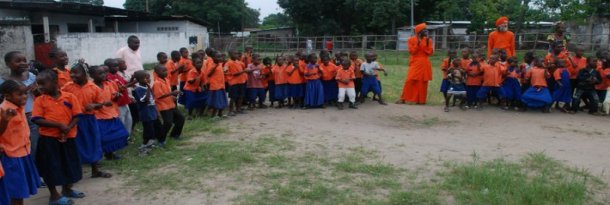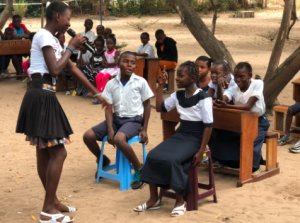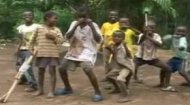Congo Education
On paper, education in the Republic of the Congo looks promising; modelled on the French educational system, it's compulsory between the ages of six and sixteen with six years of primary and seven years of secondary education. The reality, however, is somewhat different particularly for those living in rural areas as years of warfare and political instability severely damaged the standing of education in Congo Brazzaville and much infrastruacture was destroyed. However, there is now a renewed interest in the sector as it's seen as key to the country's economic development and literacy runs at 86% ~ one of the highest across Africa. Today 17.08% of Congolese spending (2020) goes on education (40% on primary, 31% secondary, and 27% tertiary) however just 1% on pre-primary provision with the country planning to increase its funding further to 20% provided the its oil revenues continue to grow. For compratative purposes, the latest % figure on education spending in Sierra Leone is 34.33% and in Nigeria 5.62% with the average for 2020, based on 28 countries, being 14.5%.
 Education is supposed to be free but, like in so many other African countries, the costs of books and pencils make it unaffordable for many families and for those children who do attend, many classrooms have no tables nor chairs, forcing students to sit on the floor when trying to learn. Education in the Republic of Congo is divided into four levels. The first level, which is optional, is a three year pre-school period up to the age of around five and a half years. Following that, all children should enrol in six years of compulsory primary school comprised of two preparatory years, two elementary years and finally two medium years. Pupils are then required to undertake the Secondary School Entry Test. Those who fail have to sit another year while those who pass then commence seven years of Secondary School, of which only the first four are free. The most recent figures suggest only 60% of children in Congo Brazzaville attend secondary school. This period is divided into grades 7-10 of 'college' education followed by grades 11-13 of 'lycee' education with successful students being awarded the Senior School Higher Certificate Examination baccalaureate. Those who wish to continue their education can then attend the country's only state funded university, the Marien Ngoubai University in the capital city Brazzaville. Education is supposed to be free but, like in so many other African countries, the costs of books and pencils make it unaffordable for many families and for those children who do attend, many classrooms have no tables nor chairs, forcing students to sit on the floor when trying to learn. Education in the Republic of Congo is divided into four levels. The first level, which is optional, is a three year pre-school period up to the age of around five and a half years. Following that, all children should enrol in six years of compulsory primary school comprised of two preparatory years, two elementary years and finally two medium years. Pupils are then required to undertake the Secondary School Entry Test. Those who fail have to sit another year while those who pass then commence seven years of Secondary School, of which only the first four are free. The most recent figures suggest only 60% of children in Congo Brazzaville attend secondary school. This period is divided into grades 7-10 of 'college' education followed by grades 11-13 of 'lycee' education with successful students being awarded the Senior School Higher Certificate Examination baccalaureate. Those who wish to continue their education can then attend the country's only state funded university, the Marien Ngoubai University in the capital city Brazzaville.
Given that 47% of the country's population is aged 15yrs or younger, this has put a strain on the accessibility of education ~ simply having enough teaching staff to educate the children and, of course, for many living in poor rural communities and those thousands of children living on the streets of cities like Brazzaville, education simply isn't an option. The goverment in Congro Brazzaville is currently implementing its 'Plan Sectoriel de l'Education' for the years 2015-2025 which plans to give all children in the country, regardless of their location, a 10-year basic education to ensure basic competencies, lower-secondary education for all and technical or vocational studies as an alternative to general studies. The plans also strives to expand pre-primary education opportunities for underprivileged children and those living in rural areas in particular. The video (below), whilst dated, gives an insight into education in the country.
|

 Education is supposed to be free but, like in so many other African countries, the costs of books and pencils make it unaffordable for many families and for those children who do attend, many classrooms have no tables nor chairs, forcing students to sit on the floor when trying to learn. Education in the Republic of Congo is divided into four levels. The first level, which is optional, is a three year pre-school period up to the age of around five and a half years. Following that, all children should enrol in six years of compulsory primary school comprised of two preparatory years, two elementary years and finally two medium years. Pupils are then required to undertake the Secondary School Entry Test. Those who fail have to sit another year while those who pass then commence seven years of Secondary School, of which only the first four are free. The most recent figures suggest only 60% of children in Congo Brazzaville attend secondary school. This period is divided into grades 7-10 of 'college' education followed by grades 11-13 of 'lycee' education with successful students being awarded the Senior School Higher Certificate Examination baccalaureate. Those who wish to continue their education can then attend the country's only state funded university, the Marien Ngoubai University in the capital city Brazzaville.
Education is supposed to be free but, like in so many other African countries, the costs of books and pencils make it unaffordable for many families and for those children who do attend, many classrooms have no tables nor chairs, forcing students to sit on the floor when trying to learn. Education in the Republic of Congo is divided into four levels. The first level, which is optional, is a three year pre-school period up to the age of around five and a half years. Following that, all children should enrol in six years of compulsory primary school comprised of two preparatory years, two elementary years and finally two medium years. Pupils are then required to undertake the Secondary School Entry Test. Those who fail have to sit another year while those who pass then commence seven years of Secondary School, of which only the first four are free. The most recent figures suggest only 60% of children in Congo Brazzaville attend secondary school. This period is divided into grades 7-10 of 'college' education followed by grades 11-13 of 'lycee' education with successful students being awarded the Senior School Higher Certificate Examination baccalaureate. Those who wish to continue their education can then attend the country's only state funded university, the Marien Ngoubai University in the capital city Brazzaville.







